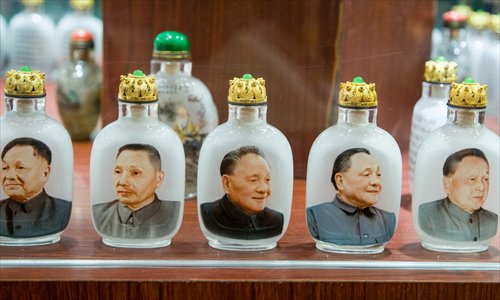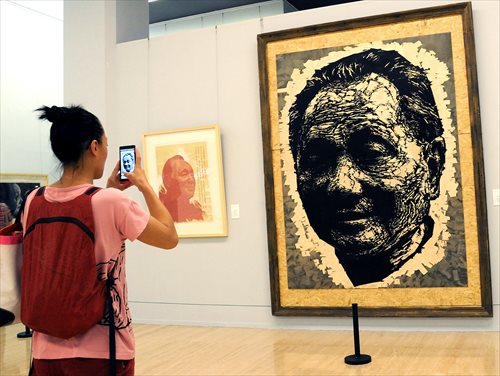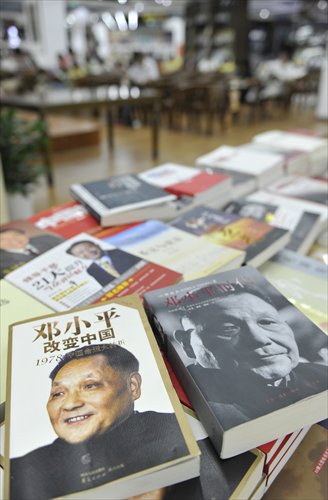As 110th anniversary of Deng’s birth approaches, echoes of history emerge

Scent bottles with portraits of Deng Xiaoping are on display at the Shenzhen International Cultural Industries Fair on May 15. Photo: CFP
As August 22 approaches - the 110th birthday of late Chinese leader Deng Xiaoping - commemorative activities have reached a climax, in the forms of articles, paintings, seminars and TV dramas.
Honored as the chief architect of the Chinese socialist reform, opening up and marketization drive, Deng has been acknowledged as the core of the second generation of central leadership which led the whole nation out of chaotic political movements into unprecedented prosperity.
The 48-episode TV series, Deng Xiaoping at History's Crossroads, has been aired in prime time on Central China Television (CCTV) since August 8. Extensive commentaries and memoirs praising Deng and his legacy have also been widely seen in Party newspapers and journals in recent days.
The public is commemorating Deng in its own ways. Many people watch the TV show at home every day on time; some have decided to visit Deng's former residence in Guang'an, Sichuan Province.
But despite the revelry, after decades of speedy development, lots of problems have emerged, such as fears of a "moral decline," wealth gap, corruption, and environmental degradation. Experts and the authorities acknowledge that China is again at a historic crossroads, which parallels the situation that Deng faced decades ago.
As China has entered a critical era of "uncharted waters" in reforms, people are hoping that yet again, major breakthroughs will be made.

A visitor takes pictures at an exhibition for Deng Xiaoping's 110th birthday in Beijing, on August 19. Photo: CFP
Profound gratitude
Long Xiaoping, 67, from Huaihua, Hunan Province, has recently taken 110 copies of newspapers related to Deng to Guang'an for a special exhibition held in the city.
"Deng resumed gaokao (national college entrance examinations). In addition, he relaxed political screenings for gaokao applicants to one's own behavior rather than family backgrounds," Long, a retired civil servant, told the Guang'an Daily. "My father joined the Kuomintang before the founding of New China. Without Deng's policy change, I had no chance of taking the gaokao."
In the last two decades, he has collected 20,000 copies of newspapers, 40 albums, 210 badges, 100 magazines and 500 books, thus making a name for himself in terms of researching Deng. The collections nearly filled his 100 square meter home, which has become a private "newspaper museum" all about Deng Xiaoping.
The gratitude toward Deng is commonly seen among seniors. But for many young people born in the 1980s, their direct memory about Deng was barely anything more than the day he passed away on February 19, 1997.
"I was in grade 10 then. All of us were ordered to watch the live broadcast of the memorial services of Deng in the classrooms," a 32-year-old resident from Xinning county, Hunan, recalled. While another 28-year-old resident from Nanjing, Jiangsu Province, recalled that her primary school erected a large portrait of Deng at the gate and they were required to give three bows to the portrait before entering the school.
In accordance with Deng's wishes, his ashes were scattered at sea. Despite having no tomb there, his birthplace of Guang'an, which Deng left at the age of 15, and never returned, has become a major place for people to pay tribute to him.
The city has been busy preparing for the commemoration event since last year.
"The whole city has become increasingly festive. The public sites and facilities like squares and overpasses are decorated with colorful lights and slogans reading 'Yuechi people miss Comrade Xiaoping forever' are everywhere," Zhang Yi, 37, a resident from Yuechi county, Guang'an, told the Global Times.
A CCTV art troupe also gave several performances in different districts and counties, he added.
"I personally am very grateful to Deng. Thanks to him, several highways and bullet trains stop here. Compared with the livelihoods in my childhood, the life here today has greatly progressed," he said.
Guang'an has been a favored destination for senior leaders.
The name of the exhibition hall, which contains Deng's former residence and officially opened in August 2004, was written in calligraphy by Jiang Zemin, the center of the third generation of Chinese leadership.
To commemorate the 100th birthday of Deng, Hu Jintao, then Chinese president, visited Guang'an and unveiled a bronze statue of Deng on August 13, 2004.
In October last year, a 3.19-square-kilometer park called Dengxiaoping's Hometown, including Deng's former residence and his statue, was sanctioned by the China National Tourism Administration as a 5-A tourist destination.
On Monday, the Deng Xiaoping Memorial Hall opened to the public after 18 months' construction, displaying many manuscripts and possessions of Deng.
Some are skeptical about value of the massive expenditure in the commemoration projects, but Zhang Yi disagrees. "The memorial park opens free of charge. The city's getting better, and the growing tourists have driven up the consumption and benefited the local people," he said.

Books about Deng Xiaoping are on sale at a bookstore in Nanchang, Jiangxi Province, on August 19. Photo: CFP
Mixed views
Some have argued that Deng's achievements have been overstated, as many conservatives who idolize the Mao era blame him for introducing capitalism into China. While some praise his decision to trim the bloated army, some say he neglected to research and develop military weapons. Some even claimed that due to his decision to "shelve disputes" in diplomatic relations, the country missed the best chances to solve maritime disputes.
While some cheered for Deng's dissolution of the cult of personality, others questioned his centralized power and the role he played in the political incidents of the late 1980s.
Ezra Vogel, author of Deng Xiaoping and the Transformation of China, argued that power centralization is reasonable for China.
"China's so big and complicated with such a long history. If the leadership is too weak and fragmented, it will be hard for the central government to control local officials and it would lead the country to chaos," Vogel told the Shanghai-based Wenhui Daily.
In November 1989, Deng quit as Chairman of the CPC Central Military Commission and Jiang Zemin took over. Four years later in March 1993, Jiang took the State presidency. Nevertheless, Deng's legacy continued exerting political influence in China for a long time, observers say.
Deng believed above all in preserving his own authority and that of the Party, Lord Patten, BBC Trust chairman and chancellor of the University of Oxford, said in an article in the Financial Times commenting on Vogel's book.
"Whether that was essential to transform China will remain the subject of increasingly open debate. Whatever the answer, Vogel makes a strong case for according Deng the prize for lifting more people out of poverty than anyone else in history," he concluded.
Strongman like Deng
"The largest spiritual legacy left by Deng Xiaoping is continuous and bold reform and opening up," Vogel said at the release of the Chinese version of his book held in Beijing in January last year.
Less than one month after the 18th National Congress of the CPC, Xi Jinping, then General Secretary of the CPC Central Committee, visited Guangdong Province in his first trip, which has been considered a sign of the new leadership's firm resolution to carry on Deng's legacy.
Recently, some people commented that President Xi is "the most transformational Chinese leader" and "most powerful" since Deng, and predicted that he will become a leader as assertive and progressive as Deng.
"Xi is acting more seemingly boldly than previous leaders because he has to," Kerry Brown, professor of Chinese Politics, University of Sydney, told the Global Times.
"Internal and external issues are now becoming very complex. China is at a key moment in its transition towards major power status, and so there are all sorts of issues that now need to be addressed. Now is not the time for weak or vacillating leadership," he said.
In addition to the relentless anti-corruption campaign, the fifth generation of leadership has made leaps on other policy issues, including abolishing the re-education through labor system, easing the one-child policy and reforming the household registration system.
To better carry out reforms, Xi has also established a central leading team for comprehensively deepening reform.
"The achievements Xi has made in past year indicate that he has the boldness to break the pattern and drive ahead the reform. The times may make him a strongman like Deng," said Wang Changjiang of the Party School of the CPC Central Committee in a report by ifeng.com.
Zhou Qiren, professor of the National School of Development at Peking University, remarked in a recent lecture that the problems left today are all difficult and need a strong leader break through vested interest groups obstructing reforms.
In an interview with the Global Times in Beijing on Wednesday, Vogel said the current Chinese leadership should learn lessons from Deng's era.
"Some of Deng's procedures were appropriate at that time but no longer appropriate now," said Vogel. "The rule of law compared to rule of individualism is more important in the new conditions."
But he suggested the present leadership should learn from Deng's era to keep China's low profile and good relations with other countries.
When comparing the situations faced by Xi and Deng, Brown said the challenges for Xi are even greater, but Vogel disagrees, saying that the barriers Deng faced were much greater. At Deng's time of transition, the country was poor and divided, and many people were afraid of changes, he said.
But Vogel admits that the days are gone when one person could make the final decision. Now things are more complicated in the leadership.
"The choice for Deng was relatively easy in some ways. He said it himself: Reform or die," Brown said. "For Xi, the issue now is that there are a range of options so it is more complex. It is not a question of where to reform but how and in what way, at what speed."
Newspaper headline: At crossroads, again